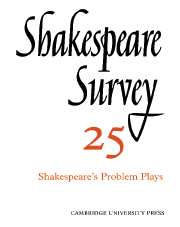Book contents
- Frontmatter
- The Problem Plays, 1920–1970: A Retrospect
- ‘Sons and Daughters of the Game’: An Essay on Shakespeare’s ‘Troilus and Cressida’
- The Options of the Audience: Theory and Practice in Peter Brook’s ‘Measure for Measure’
- Man’s Need and God’s Plan in ‘Measure for Measure’ and Mark iv
- The Design of ‘All’s Well That Ends Well’
- Directing Problem Plays: John Barton Talks to Gareth Lloyd Evans
- The Queen Mab Speech in ‘Romeo and Juliet’
- ‘Time’s Deformed Hand’: Sequence, Consequence, and Inconsequence in ‘The Comedy of Errors’
- Faith and Fashion in ‘Much Ado About Nothing’
- ‘The Merry Wives of Windsor’ as a Hallowe’en Play
- ‘The Tempest’ at the Turn of the Century: Cross-Currents in Production
- Variations Within A Source: From Isaiah XXIX To ‘The Tempest’
- The Life of George Wilkins
- A Neurotic Portia
- Of an Age and for All Time: Shakespeare at Stratford
- The Year's Contributions to Shakespearian Study 1 Critical Studies
- 2 Shakespeare’s Life, Times, and Stage
- 3 Textual Studies
- Index
- Plate section
Directing Problem Plays: John Barton Talks to Gareth Lloyd Evans
Published online by Cambridge University Press: 28 March 2007
- Frontmatter
- The Problem Plays, 1920–1970: A Retrospect
- ‘Sons and Daughters of the Game’: An Essay on Shakespeare’s ‘Troilus and Cressida’
- The Options of the Audience: Theory and Practice in Peter Brook’s ‘Measure for Measure’
- Man’s Need and God’s Plan in ‘Measure for Measure’ and Mark iv
- The Design of ‘All’s Well That Ends Well’
- Directing Problem Plays: John Barton Talks to Gareth Lloyd Evans
- The Queen Mab Speech in ‘Romeo and Juliet’
- ‘Time’s Deformed Hand’: Sequence, Consequence, and Inconsequence in ‘The Comedy of Errors’
- Faith and Fashion in ‘Much Ado About Nothing’
- ‘The Merry Wives of Windsor’ as a Hallowe’en Play
- ‘The Tempest’ at the Turn of the Century: Cross-Currents in Production
- Variations Within A Source: From Isaiah XXIX To ‘The Tempest’
- The Life of George Wilkins
- A Neurotic Portia
- Of an Age and for All Time: Shakespeare at Stratford
- The Year's Contributions to Shakespearian Study 1 Critical Studies
- 2 Shakespeare’s Life, Times, and Stage
- 3 Textual Studies
- Index
- Plate section
Summary
g.l.e. John Barton, you are, I think, one of the few directors who have produced all of the so-called Problem Plays. Do you find this a useful label?
j.b. No, I don't really. I hate categorising plays, and find it difficult to say what is a tragedy, what is a comedy, what is a romance, etc. But if I did, I think I would link All's Well That Ends Well and Measure for Measure with Twelfth Night. I believe that they carried through something that was coming to the boil in As You Like It and Twelfth Night, i.e. Shakespeare's very conscious split between the 'happy-ever-after' world of romantic comedy and his sense of what life and people are really like. I see it in As You Like It to some extent, and even more so in Twelfth Night where what happens at the end to Malvolio and Belch and Maria is set against the conventional romantic ending given to Olivia, Orsino, Viola and Sebastian. That sense of reality breaking in on convention goes further in All's Well and Measure for Measure, where a wry sense of what life's really like and what people are really like is at odds with what the story-line dictates. I think that Troilus is a much profounder, more complex, and richer play.
- Type
- Chapter
- Information
- Shakespeare Survey , pp. 63 - 72Publisher: Cambridge University PressPrint publication year: 1972

